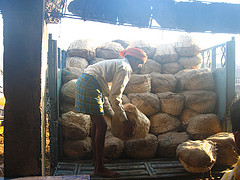Konark Sikka is an intern with IFPRI- South Asia office
A recent article in Economic & Political Weekly on The New and Changing Roles of Cold Storages in the Potato Supply Chain in Bihar, examines the role cold storages play in the potato supply chain in Bihar. Over the last few years, cold storage has rapidly grown in Bihar, due to better government policy and its spending on infrastructure and new technologies. Research shows that large potato farmers in Bihar use cold storage to store potato until the off season arrives, when they sell stock for higher prices. Small farmers benefit from this too, as they fill in this vacuum left by large farmers. Not only this, cold storages are cheap and reliable means of seed storage.
Cold storage operators have grown almost threefold in the district of Vaishali, while in the Samastipur district, they have grown almost five fold. Over the years, these cold storages have carved their niche in the supply chain system
The researchers found that cold storage operators provide other important services apart from exclusive storage. While their role in fertilizer extension is minimal, 80 percent of the cold storages provide credit to users with potato bags as collateral. They also have links with banks for this credit. It was found that more than half cold storages contacted buyers for the potato stock, while not taking in any commission of their own. It is clear that cold storages provide scope to further improve the supply chain.
Other impacts that cold storages have on the supply chain are that farmers are encouraged to postpone sales immediately after harvest in order to post higher profits once the off season hits. Research found that prices during harvest period were mostly under Rs.7 but during the off season, most prices were significantly above Rs.7, which indicates a deft move on part of the farmers. This was mostly limited to large farmers, but small farmers were able to benefit by higher prices during the harvest period.
Researchers also found that producers who stuck it out until the off season for sales, had an 82 per cent share of the final price, a significantly higher number in comparison to conventional value chains in India. Another impact of cold storages seemed to be a reduction in the wastage in value chains. The World Bank estimates that there is 24 percent wastage in the potato value chain, while other estimates point towards 12 percent for India in general. The researchers surveyed the issue themselves with the different agents in the value chain and found out that quantities of wasted potatoes hovered between 8-9.3 percent in the harvest and off season respectively.
In conclusion, the researchers recall the positive impact that cold storage has on both large farmers, who gain the ability to sell for higher prices during the off season, and small farmers, who fill in the void or use cold storages for seed potatoes. The researchers also add that the increased competition in the cold storage sector as well as the usage of cold storage providers to further extension services, would improve the value chain and benefit smallholders.



